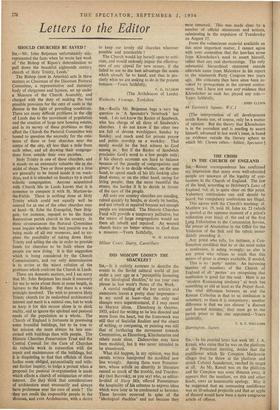THE CRISIS IN THE CHURCH OF ENGLAND
Sia,—Recent correspondence has confirmed my impression that many even well-educated people are unaware of the legality of con- fessions in the Church of England. The law of the land, according to Halsbury's Laws of England, vol. xi, is quite clear on this point. Voluntary confessions can and should be heard; but compulsory confessions arc illegal.
This agrees with the Church's teaching; cf. Matthew xvi. 19, xviii 18; John xx. 23 (which' is quoted at the supreme moment of a priest's ordination over him); cf. the end of the first Long Exhortation in the Communion Service, the prayer of Absolution in the Office for the Visitation of the Sick and the rubric imme- diately preceding it.
Any priest who tells, for instance, a Con- firmation candidate that he or she must make a confession, is acting wrongly; so also is any priest who refuses to teach that this means of grace is always available, if needed.
This is no party' matter. An increasing 'number of members of the Church of England of all parties' are recognising that oonfession is good for the soul. Here is no
modern Romanising tendency' at work but something as old at least as the Prayer Book. The vital difference between us and the Roman Catholics is that to us confession is voluntary, to them it is compulsory : another difference is that we can choose ' a discreet and learned minister,' they must go to the parish priest or the one appointed.—Yours faithfully,


































 Previous page
Previous page